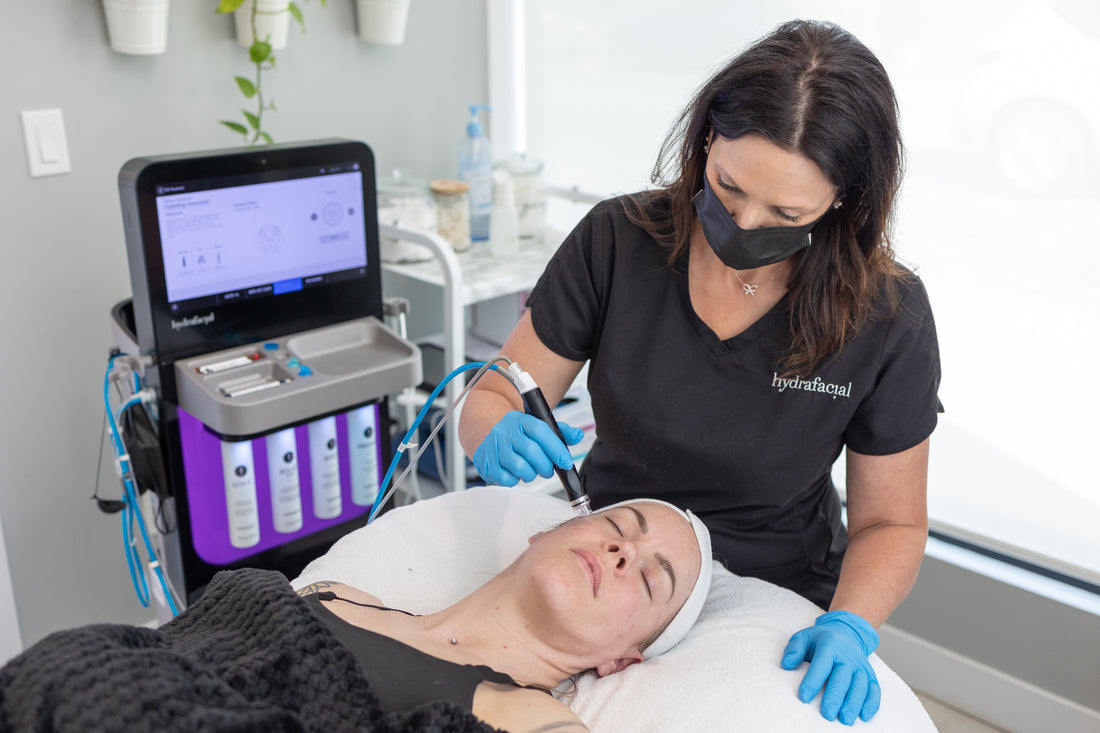
Chemical vs. Physical Exfoliation: What Type of Exfoliation Is Best For Your Skin?
Share
Did you know that, every 28 days or so, our skin naturally sheds dead skin cells to make room for new cells? When those dead skin cells shed, they don’t always shed completely and can appear as dry, flaky patches on your skin. This is when chemical or physical exfoliation comes into play and helps to prevent those flakes and dry patches. Additionally, chemical exfoliants will regulate skin cell turnover, help to lighten pigmentation, reduce fine lines and wrinkles, and stimulate collagen production! As we age, our skin cell turnover starts to slow down, leading to an increase in fine lines, wrinkles, and other signs of aging. Using a chemical exfoliant will keep skin cell turnover regulated!

Why Should You Exfoliate?
There are several benefits to exfoliating your skin. Proper exfoliation can:
- Brighten your complexion;
- Improve the appearance of your skin;
- Help other skincare products penetrate deeper;
- Prevent pore clogging, acne spots, blackheads, and whiteheads;
- Stimulate collagen synthesis to improve skin texture and integrity;
- Regulate skin cell turnover;
- Keep your skin looking younger, plump, and tight.
Overall, regular exfoliation can be a game-changer in putting your best face forward and setting you on track to brighter, more youthful looking skin, but which type of exfoliation is best for you?
What Is Chemical Exfoliation?
Chemical exfoliation is a method of exfoliation that uses different chemicals, including hydroxy acids and retinol, with enzymes to gently loosen the upper layers of the skin and remove loose dead skin cells. AHAs, BHAs, and enzymes can all be used as a chemical exfoliant.
AHAs (Alpha hydroxy acids)
These water-soluble acids, typically derived from sugary fruits, produce a peeling action that helps to fade pigmented spots and even out skin texture. Some examples of AHAs include glycolic aid, lactic acid, citric acid, tartaric acid, and malic acid.
BHAs (Beta hydroxy acids)
BHAs are oil-soluble and go deep into the hair follicles, clear out debris and sebum, and unclog pores. The most common BHA is salicylic acid, which is well-known as an acne treatment.
Enzymes
Enzyme peels are another chemical exfoliant that gently cleanses and exfoliates the skin without getting as deep and aggressive as the acid options. These peels are most ideal for sensitive skin.
Chemical exfoliation can be done in the form of home care products that will encourage skin cell turnover without peeling the skin, or in-clinic treatments that range from a gentle peel where you won't peel but will receive the benefits of a higher concentration of ingredients, to a more advanced one where you can peel for up to seven days.

What Is Physical Exfoliation?
A physical exfoliant, or anything that requires manual scrubbing or rubbing, can be used once a week or every other week to loosen and slough away the dead skin cells from your face or body. These exfoliants can include cleansing scrubs, body brushes, loofahs, and even a simple washcloth. With physical exfoliation, it’s easy to overdo it and irritate your skin, so be gentle with yourself.
How Often Should You Exfoliate?
How often you should exfoliate can vary by skin type, but as a general rule, you should exfoliate 1-2 times per week. If you have oily skin, you may exfoliant more often, but it’s a good idea to discuss this with your medical esthetician. Additonally, a chemical exfoliant can be used daily (depending on the product itself), whereas a physical exfoliant shouldn't be used more than 3 times a week.
Is Chemical or Physical Exfoliation Best For Your Skin Type?
The most effective way to understand whether chemical or physical exfoliation is best for your skin type, or even what product is best, would be to book a skin consultation with a medical esthetician. At Smooth Effects, we offer free skin consultations in-clinic or virtually to help you understand your skin better and identify the products and treatments that will help you to achieve the results you’re after.
Chemical and physical exfoliation can both be used to achieve a brighter, more even and youthful appearance. What’s right for your skin might not be what’s right for others, which is why we recommend a skin consultation before spending your money on products that might not work for you. Once you’ve identified the proper exfoliation routine for your unique skin, Smooth Effects can provide product and treatment suggestions to help you put your best face forward.
